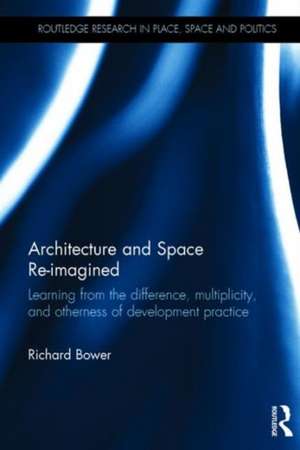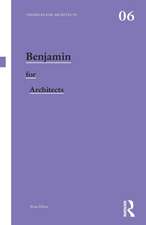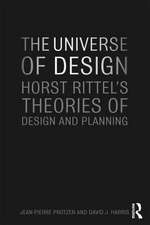Architecture and Space Re-imagined: Learning from the difference, multiplicity, and otherness of development practice: Routledge Research in Place, Space and Politics
Autor Richard Boweren Limba Engleză Hardback – 30 iun 2016
Exploring these themes offers a critical examination of alternative development practices methods in the Global South, re-contextualising them as architectural engagements with socio-political space. The comparison of such interdisciplinary contexts and discourses reveals the political, social, and economic resonances inherent between these previously unconnected spatial protagonists. The interdependence of spatial issues of choice, value, and identity are revealed through a comparative study of the discourses of Henri Lefebvre, John Turner, Doreen Massey, and Nabeel Hamdi. These key protagonists offer a critical framework of discourses from which further connections to socio-spatial discourses and concepts are made, including post-marxist theory, orientalism, post-structural pluralism, development anthropology, post-colonial theory, hybridity, difference and subalterneity.
By looking to the spaces and practices of alternative development in the Global South this book offers a critical reflection upon the working practices of Westernised architecture and other spatial and political practices. In exploring the methodologies, implications and values of such participatory development practices this book ultimately seeks to articulate the positive potential and political of learning from the difference, multiplicity, and otherness of development practice in order to re-imagine architecture and space.
.
Din seria Routledge Research in Place, Space and Politics
-
 Preț: 356.64 lei
Preț: 356.64 lei -
 Preț: 326.49 lei
Preț: 326.49 lei -
 Preț: 302.69 lei
Preț: 302.69 lei - 16%
 Preț: 324.86 lei
Preț: 324.86 lei -
 Preț: 389.38 lei
Preț: 389.38 lei -
 Preț: 448.67 lei
Preț: 448.67 lei -
 Preț: 416.22 lei
Preț: 416.22 lei -
 Preț: 409.87 lei
Preț: 409.87 lei -
 Preț: 416.22 lei
Preț: 416.22 lei -
 Preț: 449.41 lei
Preț: 449.41 lei - 26%
 Preț: 761.76 lei
Preț: 761.76 lei - 21%
 Preț: 256.32 lei
Preț: 256.32 lei - 20%
 Preț: 272.50 lei
Preț: 272.50 lei -
 Preț: 385.41 lei
Preț: 385.41 lei -
 Preț: 389.38 lei
Preț: 389.38 lei -
 Preț: 362.89 lei
Preț: 362.89 lei - 26%
 Preț: 764.20 lei
Preț: 764.20 lei -
 Preț: 386.39 lei
Preț: 386.39 lei - 9%
 Preț: 936.56 lei
Preț: 936.56 lei
Preț: 1002.68 lei
Preț vechi: 1222.78 lei
-18% Nou
Puncte Express: 1504
Preț estimativ în valută:
191.87€ • 205.17$ • 159.97£
191.87€ • 205.17$ • 159.97£
Carte tipărită la comandă
Livrare economică 18 aprilie-02 mai
Preluare comenzi: 021 569.72.76
Specificații
ISBN-13: 9781138934146
ISBN-10: 1138934143
Pagini: 260
Dimensiuni: 156 x 234 x 20 mm
Greutate: 0.52 kg
Ediția:1
Editura: Taylor & Francis
Colecția Routledge
Seria Routledge Research in Place, Space and Politics
Locul publicării:Oxford, United Kingdom
ISBN-10: 1138934143
Pagini: 260
Dimensiuni: 156 x 234 x 20 mm
Greutate: 0.52 kg
Ediția:1
Editura: Taylor & Francis
Colecția Routledge
Seria Routledge Research in Place, Space and Politics
Locul publicării:Oxford, United Kingdom
Public țintă
Postgraduate and UndergraduateCuprins
Preface
Introduction
1. Dialectical Materialism and Participatory Housing
2. Spatial Relations, Difference, and Multiplicity
3. Geometries of Power, Hegemony, and Small Changes
4. Identity and Practice
5. Unknown Space and Open Values: Coevalness, textuality, and critical spatial practice.
6. Architecture and Space Reimagined?
Introduction
1. Dialectical Materialism and Participatory Housing
2. Spatial Relations, Difference, and Multiplicity
3. Geometries of Power, Hegemony, and Small Changes
4. Identity and Practice
5. Unknown Space and Open Values: Coevalness, textuality, and critical spatial practice.
6. Architecture and Space Reimagined?
Notă biografică
Richard Bower is a Lecturer in Architecture and Critical Spatial Theory at The University of Central Lancashire, UK.
Descriere
By looking to the spaces and practices of alternative development in the Global South this book offers a critical reflection upon the working practices of Westernised architecture and other spatial and political practices. In exploring the methodologies, implications and values of such participatory development practices this book ultimately seeks to articulate the positive potential and political of learning from the difference, multiplicity, and otherness of development practice in order to re-imagine architecture and space.










